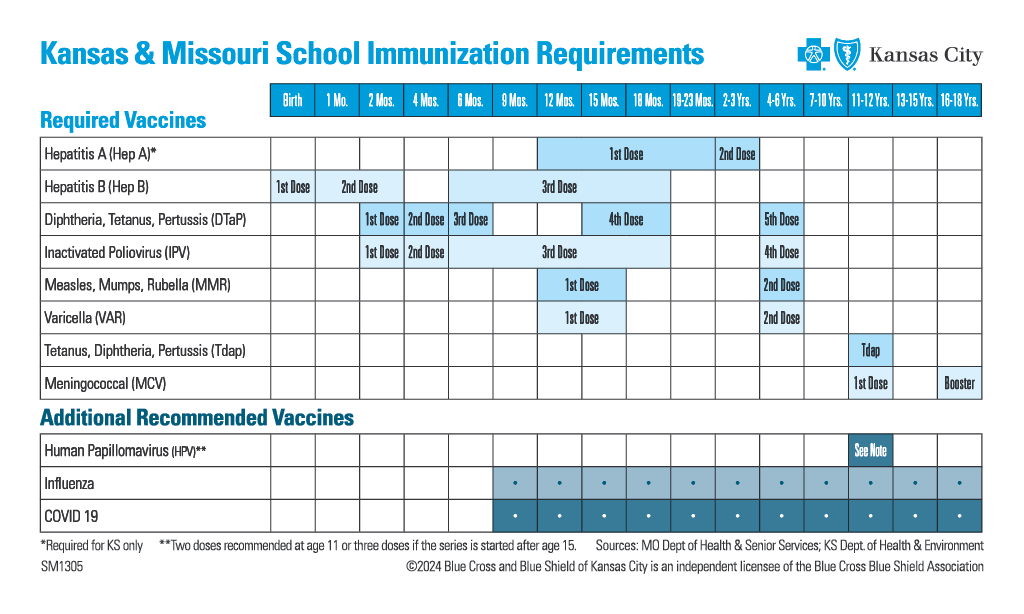
Back-to-School Boosters: What vaccines your child should have before hitting the books this fall
It’s time to send your kids back to school, or maybe you yourself are heading back. Give your children and family the support they need to stay healthy through the gamut of sniffles, coughs, and other illnesses commonly passed around the classroom.
Your school-age children may be due for routine vaccinations that can keep them safe from certain illnesses.
What vaccines should my child have?
The chart below shows what vaccinations your child should receive at each stage of their life.
For school-age children, parents should consider key vaccinations including measles, mumps, rubella (MMR), varicella (VAR), meningococcal (MCV), and more.

Measles, mumps, and rubella vaccine
The measles, mumps, and rubella (MMR) vaccine protects against the three viruses for life.
The viruses can cause a variety of symptoms including fever, muscle aches, sore throat, rash, and, rarely, more serious complications.
Children should get their first dose of the MMR vaccine when they are between 12 to 15 months old. A second dose is recommended between 4 and 6 years old.
Your doctor may recommend a third dose of the MMR vaccine if you live in an area with an active mumps outbreak.
Varicella vaccine
No one wants to take an oatmeal bath if they can avoid it. It’s a common at-home remedy for the varicella virus, more commonly known as chickenpox.
The varicella (VAR) vaccine prevents the disease, which causes a host of symptoms but is most known for the itchy, red, spotty rash that lasts for about a week. People who contract chickenpox are more prone to develop shingles later in life. Most people who receive the recommended two doses of vaccine will be protected for life.
Take your child to get the VAR shot at 12 to 15 months old, and again at 4 to 6 years old, to make sure they’re protected.
Your doctor may offer you the option to receive the varicella vaccine in a single shot together with the MMR vaccine. This is called the MMRV vaccine, and it is available to children 12 months of age or older.
Meningococcal vaccine
Meningococcal disease can cause the dangerous but now rare meningitis infection, which can affect the lining of the brain and spinal cord. Meningococcal disease can also cause a blood infection.
Infants, children, and young adults are at increased risk for contracting meningococcal disease. You can protect your children against this illness with the meningococcal (MCV) vaccine.
Even when treated, meningococcal disease can result in serious complications, including long-term disabilities and death.
Children should get their first dose of MCV at 11 or 12 years old, followed by a booster shot at 16.
Why is it important for my child to be vaccinated?
Vaccinating against these illnesses protects your child and helps prevent new cases in our community.
Vaccines also protect your child and other loved ones who might be ineligible for vaccination in the case of an outbreak, like the measles outbreak in Southwest Kansas.
What about potential side effects?
Some common side effects of vaccination are:
- Redness or soreness at the site of injection
- Headache
- Fever
- Tiredness
- Muscle and/or joint pain and stiffness
Just like any other medical procedure, there is a remote chance of an adverse reaction. You should monitor your child closely after getting a vaccine. If you suspect a severe allergic reaction, call 911.
If your child is not vaccinated against these diseases, consider talking to your doctor about the vaccinations. Your provider can help answer any questions or address any concerns you may have about the vaccines.
Don’t forget yearly vaccinations
It’s important to stay up to date on yearly vaccinations, too, like the flu and COVID-19 shots, to protect your child against seasonal illness. Make sure to take your child to the doctor for these shots annually, as the vaccines are designed to treat specific strains of the viruses that could be more prevalent that year.
The flu shot is available to Blue KC members for $0 at in-network providers. The best time to get the flu shot is in September and October. You can often ask your provider to administer the COVID-19 shot at the same time.
Blue KC members with access to Spira Care Centers1 can call 913-29-SPIRA (77472) from 7:30 a.m. to 5 p.m. Monday through Friday, or 8 a.m. to noon Saturday, to schedule an appointment for their child’s shots.
Sources
- https://www.cdc.gov/vaccines/hcp/current-vis/mmr.html
- https://www.cdc.gov/vaccines/hcp/current-vis/varicella.html
- https://www.cdc.gov/vaccines/hcp/current-vis/mmrv.html
- https://www.cdc.gov/vaccines/hcp/current-vis/meningococcal-acwy.html
- https://www.pbs.org/newshour/health/why-getting-your-flu-and-covid-19-vaccines-before-the-holidays-is-a-good-idea
- https://www.cdc.gov/flu/vaccines/coadministration.html
- https://www.kdhe.ks.gov/2314/Measles-Outbreak-Data
- https://www.cdc.gov/vaccines/basics/possible-side-effects.html
1 Available to Blue KC members in plans with exclusive access to Spira Care Centers. For costs and further details of the coverage, including exclusions, any reductions or limitations and the terms under which the policy may be continued in force, contact your Blue KC representative.


